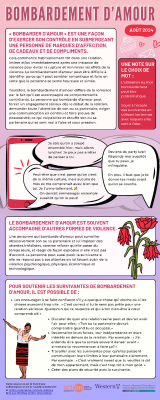Our Work
.
Love Bombing
-
English
-
Français
Love Bombing
This infographic endeavours to describe a term (love bombing) that is becoming more commonly used in discussions about violence and relationships. It shares what love bombing is, how it may occur, and what can be done to support survivors of love bombing.
We acknowledge and share the concerns surrounding this term and invite dialogue on alternative ways to capture this phenomenon through email and social media. Still, we believe describing this term is crucial in recognizing the forms of violence that survivors are identifying and the terminology they are utilizing.
A note on language: The use of the word bombing can be harmful. Follow the lead of survivors in using the terms they feel comfortable with.
It usually begins early in an intimate relationship and/or following an incident of abuse to avoid a breakup and minimize the abuse. Love bombing can be difficult to identify because it can seem romantic and make the person feel happy and loved.
However, love bombing differs from romance as it occurs along with controlling behaviours. The person love bombing might push for a serious commitment early on, demand all their partner's attention, require constant communication, and show possessiveness which leaves their partner feeling guilty, uncomfortable, pressured, and smothered.
For example, a person experiencing love bombing may receive texts like:
-
I know we just had dinner last night but let’s meet for lunch! I cannot stop thinking about you.
-
Maybe it is because we are from the same culture, but no ex got me like you do. We must be soulmates. I love you so much. 🥰 Let’s move in together asap.
-
Please leave the party!! Reply as soon as you can because I am worried. I also need to give you your medicine before bed.
Love bombing often occurs with further forms of abuse.
A person who love bombs may obsessively monitor their partner and place unrealistic and unfair expectations on them, such as denying personal time, and react explosively if the survivor disagrees. They may also punish the survivor for not meeting their expectations resorting to emotional, physical, financial, and technology-facilitated abuse.
Supporting survivors of love bombing can include:
- Encouraging them to trust themselves if something feels off and things are moving too fast: “It’s okay if you are not feeling ready for a serious commitment. Someone who respects and cares for you will understand!”
- Discussing what healthy relationships can and should look like with them: “Your partner should understand if you are busy.”
- Recognizing their strengths, independence, and interests outside of the relationship. For instance: “I heard you used to go dancing a lot - would you like to do that again?”
- Working with survivors to communicate clear boundaries with their partners. For example: “It is sweet you want a key to my place, but it feels too soon.”
- Building safety plans with the survivor.
Citation: Lalonde, D. (2024). Love Bombing. Learning Network Infographic. London, Ontario: Centre for Research & Education on Violence Against Women & Children.
Graphic Design:
Dianne Lalonde, Research and Knowledge Mobilization Specialist, Learning Network
Emily Kumpf, Centre for Research & Education on Violence Against Women & Children, Western University
Bombardement d'amour
Cette infographie présente un terme (bombardement d’amour) qui est de plus en plus utilisé dans les discussions concernant la violence et les relations intimes. On y trouve ce qu’est le bombardement d’amour, comment cela peut se produire, et ce qui peut être fait pour soutenir les survivantes de bombardement d’amour.
Nous reconnaissons et partageons des inquiétudes sur ce terme et nous vous invitons à échanger régulièrement par courriel ou sur les médias sociaux pour décrire ce phénomène d’autres façons. Cela dit, nous croyons qu’il est crucial d’aborder ce terme pour reconnaître les formes de violence identifiées par les survivantes et la terminologie qu’elles utilisent.
Une note sur le choix de mot : L’utilisation du mot bombardement peut être problématique. Soyez à l’écoute des survivantes en utilisant les termes avec lesquels elles sont à l’aise.
Cela commence habituellement tôt dans une relation intime et/ou immédiatement après une instance de violence pour éviter la rupture et minimiser les effets de la violence. Le bombardement d’amour peut être difficile à identifier parce qu’il peut sembler romantique et faire en sorte que la personne se sente heureuse et aimée.
Toutefois, le bombardement d’amour diffère de la romance par le fait qu’il est accompagné de comportements contrôlants. La personne qui bombarde d’amour peut forcer un engagement sérieux dès le début de la relation, demander toute l’attention de son ou sa partenaire, exiger une communication en continu et faire preuve de possessivité, ce qui culpabilise et étouffe son ou sa partenaire qui se sent mal à l’aise et sous pression.Par exemple, une personne qui vit un bombardement d’amour peut recevoir des textos comme :
-
Je sais qu’on a soupé ensemble hier, mais allons luncher! Je peux pas arrêter de penser à toi.
-
Peut-être que c’est parce qu’on vient de la même culture, mais aucune de mes ex me comprenait aussi bien que toi. Je t’aime tellement. 🥰 On devrait emménager ensemble aussitôt qu’on le peut!
-
Reviens du party svp!! Réponds-moi aussitôt que tu peux, je m’inquiète. En plus, il faut que je te donne tes meds avant qu’on se couche.
Le bombardement d'amour est souvent accompagne d'autres formes de violence.
Une personne qui bombarde d’amour peut surveiller obsessivement son ou sa partenaire et lui imposer des attentes irréalistes, comme refuser qu’elle passe du temps seule, et réagir de façon explosive si elle n’est pas d’accord. La personne peut aussi punir la survivante si elle ne répond pas à ses attentes en lui faisant subir de la violence psychologique, physique, économique et technologique.
Pour soutenir les survivantes de bombardement d'amour, il est possible de :
- Les encourager à se faire confiance s’il y a quelque chose qui cloche ou si les choses avancent trop vite : « C’est correct si tu te sens pas prête pour une relation sérieuse. Quelqu’un qui te respecte et qui a ton bien-être à cœur comprendrait! »
- Discuter de quoi une relation saine peut et devrait avoir l’air pour elles : « Ton ou ta partenaire devrait comprendre quand tu es occupée. »
- Reconnaître leurs forces, leur indépendance et leurs intérêts en dehors de la relation. Par exemple : « J’ai entendu dire que tu sortais souvent danser avant – aimerais-tu recommencer à faire ça? »
- Travailler avec les survivantes pour qu’elles puissent communiquer leurs limites à leur partenaire clairement. Par exemple : « C’est vraiment sweet que tu veuilles la clé de mon appartement, mais c’est trop tôt à mon goût. »
- Créer des plans de sécurité avec la survivante.
Citation : Lalonde, D. (2024). Bombardement d'amour. Infographie Learning Network. London, Ontario : Centre de recherche et d’éducation sur la violence contre les femmes et les enfants.
Conception graphique :
Dianne Lalonde, spécialiste de la recherche et de la mobilisation des connaissances, Learning Network
Emily Kumpf, Centre de recherche et d’éducation sur la violence contre les femmes et les enfants, Université Western
All our resources are open-access and can be shared (e.g., linked, downloaded and sent) or cited with credit. If you would like to adapt and/or edit, translate, or embed/upload our content on your website/training materials (e.g., Webinar video), please email us at gbvln@uwo.ca so that we can work together to do so.






